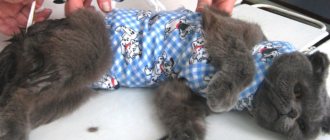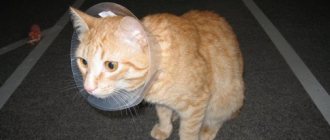photo from the site: www.liveinternet.ru
The pet purr was affectionate only for the time being - now he rushes at his owners, hisses, releases his claws and does not allow himself to be touched. How to explain the sudden change in mood, and why did the cat become aggressive? Veterinarians say that a pet's anger can be caused by a great variety of reasons: among them, sudden excitement, pain, fear, fighting for territory and much more. Very often, the character of tailed four-legged friends who walk on their own changes dramatically after castration or sterilization. From our article you will learn what explains the rage of a pet and how to avoid it.
The cat behaves aggressively: we are looking for the reason
In fact, by nature, domesticated felines are affectionate and playful. All you have to do is pet the fluffy sissy, and he will jump onto your lap and announce his good-natured attitude with a loud purr. What to do if the picture observed by the owners every day is far from the described idyll, and the residents of the apartment have to fight to win their personal space and avoid the pet?
Most often, a cat’s aggressive behavior is a problem whose roots go deep into your pet’s childhood. If he grew up in an environment of warmth and care, you will not have to deal with anger and hissing in response to the desire to play or pet the cat. However, there are cases in which an unpleasant character trait directly depends on the breed. So, many of us have heard more than once that Siamese cats are one of the wildest and most difficult to train. The Persians and the British differ in their stubbornness and freedom-loving disposition.
What else can influence a pet's behavior? Here are some interesting facts that confirm that anger cannot be without cause.
- White cats are considered one of the most aggressive. Why? They say that this feature of their behavior is associated with the predominance of Angora blood.
Interesting fact
Angoras themselves often suffer from deafness. This feature affects their character - they constantly feel unprotected (they cannot hear the approach of the offender), so they are always on guard.
- The capriciousness and willfulness of seals and cats of all breeds in most cases can be explained quite simply: animals do not like being treated with familiarity. Young children should be especially careful: children often forget about everything in the world and selflessly squeeze their pet, not even realizing that they can cause him pain or discomfort. It should be explained to the child in advance: a cat is not a toy, but a living creature, and it must be treated with respect and attention.
Psychological aspects
Cats are unique and very independent animals. In many ways, their communication with people is based on the principles of mutual trust. A cat goes to its owner only if it completely trusts him. When you take him to a veterinary clinic where the pet could be hurt, trust is broken. What can we say about castration, when an animal undergoes surgery! Of course, his attitude towards the owner may noticeably worsen. Of course, a lot depends on the initial character of your pet. Some immediately after recovering from anesthesia go into their arms, others hide under the sofa, others become aggressive and scratch when trying to pet them. True, cats, despite their vindictiveness, can forgive. But here everything depends on you.
Firstly, do not scold an animal under any circumstances, even if it scratches/bites you. This will only make things worse. Secondly, do not try to impose yourself: if the cat makes it clear by its behavior that it is not happy with your company, it is better to give it its favorite food and leave. Let the pet calm down, after which he will seek your company. What if this doesn’t happen, and you just can’t come to an agreement with the cat?
Then you will have to take the initiative yourself. Talk to your pet more often, give him the most delicious pieces of food from your hands. Gradually, the trusting relationship between you and your pet will return, but this will require a lot of time and your patience.
Why cats and kittens are aggressive: how to divide territory
photo from website: vashipitomcy.ru
Are you used to seeing your pet in a close family circle and never want to part with it? It's time to remember: cats, like people, need personal space, and they may well fight for it if they notice that the owner does not allow them to take a step without supervision.
Most cats are loners who need their own bed or house. And even better - a full-fledged place in the house where your furry friend will take a break from playing with the family. If another animal or person invades the purr's territory, the initially harmless pet can turn into a ferocious tiger. Therefore, carefully monitor the behavior of a cat living in the same house with our other smaller brothers, and find ways to divide the room into zones, and also devote time to raising the tailed and whiskered ones. Training takes time and effort, but without it you will be forced to constantly endure hissing and aggression, which often extends not only to four-legged animals, but also to two-legged ones.
Notes
On breeder forums you can often find advice about using catnip as a sedative. So here it is. It should not be used in this capacity. For many cats, it has the exact opposite effect, meaning they become even more agitated and aggressive.
Moreover, some novice breeders are trying to use... tincture of valerian officinalis! We don’t think it’s worth telling what consequences giving it to a cat with an “unstable psyche” leads to. So you shouldn’t experiment with traditional medicine. It remains to be seen exactly how they will affect the character of an already aggressive animal.
Castration and sterilization: should we be afraid of changes in character?
photo from website: www.petfinder.com
Many owners say that after castration or sterilization the cat has become aggressive, and are trying to find out why surgical intervention has such an effect on the pet’s mood and what its owners should do. However, there are no reliable facts confirming such behavior in animals that have had a visit to the doctor. As a rule, pets, on the contrary, become calmer and more affectionate, but irritation as an acquired character trait is extremely rare in such individuals.
The exception is animals that showed obstinacy and anger before the procedure and continue to attack their owners after the operation. In this case, you need to start training the cat: its character will not change unless you take urgent measures.
general information
First, let's figure out what castration is. Contrary to popular belief, this procedure does not always involve the physical removal of the testes.
“Castration” refers to the suppression of an animal’s libido and sexual function.
True, in some cases the ability to mate is preserved (ligation of the seminiferous tubules), but such techniques are used vanishingly rarely in practice. In most situations, castration of animals not only helps to cope with the worsening problem of the increasing number of stray cats, but also improves the health and increases the life expectancy of the pet. It has been clearly proven that sterilization reduces the risk of developing cancer of the reproductive system. If you castrate a cat before the onset of puberty, then the likelihood of developing cancer becomes almost zero.
It is the last point that I would like to focus your attention on. Remember that castration gives more positive effects only if the procedure was carried out on time! So, if by the time the cat was already a gloomy “beech” with a quarrelsome character, the operation will have an effect late, or may not work at all... In addition, it is necessary to remember some aspects of the sexual and physiological maturation of animals.
If the cat has already had time to walk with cats, and was castrated at the age of three or four years, then a special reflex arc has managed to take hold in the animal’s brain, and a stable hormonal background is formed. When the testes are removed, a sharp disturbance of the latter occurs, which is why the animal’s behavior may well change radically.
What to do in this case? Perhaps you can’t argue with physiology - initially you are unlikely to be able to influence the cat’s behavior in any way. We'll have to be patient and wait. Over time, the “hormonal storm” will subside, after which the animal will become more adequate.
The conclusion is simple: if possible, try to castrate the cat as early as possible. This is good for his health, and your nerves will subsequently be healthier.
Why does a cat behave aggressively: what happens after birth
Females experience pregnancy while under constant stress. After carrying kittens and giving birth, the pet’s behavior often changes: a previously playful and affectionate cat may attack the owner, bite or scratch him.
photo from website: icatcare.org
It is important to remember that any irritants can traumatize the psyche of your pet, who is going through one of the most difficult periods in her life. So, it is necessary to exclude all loud sounds and do everything to ensure that the animal does not experience anxiety and stress. If you notice that your mother is looking for a secluded place, let her rest and do not disturb her.
Why did the cat become aggressive after giving birth and what to do? A veterinarian can answer this question. Sometimes the doctor prescribes special means to improve the animal’s well-being and relieve irritability:
- pheromones;
- catnip;
- anxiolytics - only under the supervision of a specialist.
How to get your pet to be himself again
- Keep calm and give the cat time
If a cat that is friendly and enjoyed being petted before neutering becomes withdrawn or aggressive after neutering, it is natural that the guardian will want to restore their pet's old temperament as quickly as possible. However, there are often problems with this impatience. Your cat will need some time after surgery to process the pain, strange smell, and hormonal changes associated with it. Show your cat that nothing has happened that he should worry about. The more normal you behave, the faster your cat will return to normal.
- Respect the animal's need for solitude and peace
Animals also need rest and peace after difficult experiences. Therefore, make sure that the cat's environment is not too loud or disturbing. Even if you can take your pet home a few hours after the procedure, do not underestimate the consequences of neutering. Some cats prefer to be alone, others will require your presence and proximity. Don't force the cat to do everything he doesn't want - leave the initiative to him. If your cat wants to crawl under the couch, don't try to force her to do anything else. Respect his need for peace and wait for the cat to become active again.
- Pay attention to the cat, but ignore aggressive behavior
Respecting your cat's need for solitude does not mean ignoring your cat completely. Make sure your cat has direct access to a water bowl, a cozy den, and be prepared when your cat begins to demand your attention. You can then try to distract your pet with a toy, but don't be surprised or angry if he doesn't show any activity or just becomes aggressive. Then ignore his behavior. Don’t panic, don’t yell at the cat, don’t get angry - with any such reaction you will only increase the animal’s aggression.
Causes of aggression in cats: diseases
photo from the site: www.catbehaviorassociates.com
Often the character of pets changes due to deteriorating health. Be sure to take your pet to the veterinarian: the cause of anger and constant attacks on pets can be:
- ischemic encephalopathy;
- toxoplasmosis;
- hyperthyroidism;
- epilepsy;
- heavy metal poisoning, etc.
Why did the cat become very aggressive, and what to do if the animal attacks its owner? Most often, consultation with a specialist is enough to quickly solve the problem. Remember: irritability and anger can be caused even by a banal hormonal imbalance. If your pet begins to behave aggressively, consider whether spaying, neutering, or therapy by an experienced doctor may be the best option.
Can a cat's behavior change for the worse after sterilization?
What should you do if your cat’s behavior changes... for the worse after castration? The risk of a cat becoming more aggressive after castration is low, but it still exists. Veterinarians rarely describe such cases, but cat caretakers often talk about this topic on forums. Where does this cat behavior come from? How can we force our beloved pet to return to normal? The answers to these questions can be found below.
How can you prevent problems after sterilization?
- How to avoid stress before and after the procedure
There are several preparation steps you can take before neutering to ensure that your recovery period is as successful and stress-free as possible. The cat should be transported in the correct manner, not on a guardian's shoulder or on a leash. A familiar box will not disturb the cat, it will help him remain relaxed, which will likely create favorable conditions for anesthesia and minimize the risk of possible complications.
After the procedure, which lasts about 30 minutes, the cat should have a chance to calmly wake up from the anesthesia and rest. If your pet really loves his crate, you can put him in it to sleep. Place the conveyor in a warm (anesthesia cools the body) and dark place, away from noise. Check on your pet from time to time, pet it if you can, and try to get it to understand that everything is okay - even if after waking up from anesthesia it is still barely able to stand and looks surprised. Don't panic, this is normal!
- Arrange time to be with your cat after surgery
It is important to organize your free time after castration. Take a few days off and just be with your pet. Anesthesia and surgery are difficult and tiring experiences for everyone. During these uncertain and stressful times, your cat needs you, whether she is friendly or aggressive.
Do pheromone sprays help?
If your peace, closeness and stroking of your pet do not help, and your cat is very anxious, nervous or aggressive after the procedure, you can try using pheromone sprays. When a cat feels safe in a given area, it begins to release pheromones (smell). These steps are a sign of well-being and a feeling of security. Synthetic pheromones make animals feel safe even during stressful situations or environmental changes.











